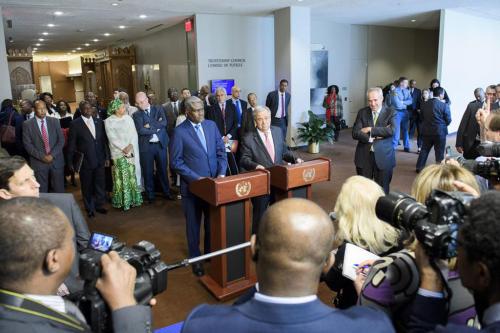UN, African Union voice concern over protracted political crisis in Guinea-Bissau
The top leaders of the African Union and the United Nations on Saturday expressed concern over the prolonged political crisis in Guinea-Bissau, condemning the recent actions taken by the national authorities to prevent a political party from holding its conference.

Secretary-General António Guterres (at podium, right) and Moussa Faki Mahamat, Chairperson of the African Union Commission, address the press following the signing of a Joint UN-AU Framework for Enhancing Partnerships on Peace and Security in 2017 (File).
“The Chairperson of the African Union Commission, Moussa Faki Mahamat, and the Secretary-General of the United Nations, António Guterres, express concern over the protracted political crisis in Guinea-Bissau despite the multiple opportunities offered to the main political stakeholders to arrive at a consensual arrangement,” said an AU-UN joint statement.
“They condemn the recent actions taken by the national authorities to prevent the African Party for the Independence of Guinea and Cabo Verde (PAIGC) from convening and holding its Party Congress, including the directive given to national security services to evacuate and shutter the party's headquarters,” it added.
Mr. Faki Mahamat and Mr. Guterres called on all relevant authorities to strictly adhere to international human rights and humanitarian law and to immediately remove all restrictions on the right to peaceful assembly, political participation and freedom of speech.
They fully endorsed the recent decisions on Guinea-Bissau taken by the Economic Community of West African States (ECOWAS) on 27 January and endorsed by the AU on 29 January.
They also supported the measures being taken by ECOWAS against “political obstructionists” in the country, welcoming the communiqué issued by the ECOWAS ministerial mission that visited Guinea-Bissau on 31 January and 1 February.
Further, they reiterated their endorsement of the centrality of the Conakry Agreement of 14 October 2016, which, inter alia, provides for the appointment of a consensual Prime Minister, and called on the main political stakeholders to faithfully and urgently implement this Agreement, as well as the ECOWAS Roadmap to which they have all signed up to.
Mr. Faki Mahamat and Mr. Guterres reaffirmed their commitment to continue to closely follow all political developments and to support ECOWAS in its efforts to ensure a swift resolution of the protracted crisis in Guinea-Bissau, and stand ready to employ additional measures, should the situation warrant it.
According to the UN Department of Political Affairs (DPA), Guinea-Bissau has been plagued by chronic political instability since gaining independence in 1974.
The DPA provides support and oversight to the UN Integrated Peacebuilding Office for Guinea-Bissau (UNIOGBIS), a special political mission first established in 1999 following a two-year civil war in the country. Since mid-2016, the Mission is headed by the Secretary-General's Representative, Modibo I. Touré.
The main priorities of UNIOGBIS are to support efforts to consolidate constitutional order, further political dialogue and national reconciliation, encourage security sector reform, and promote respect for human rights and the rule of law.
The mission has provided assistance in several national elections, including during the legislative and presidential elections in April and May 2014, and has again been mandated by the Security Council to work closely with national authorities as well as the United Nations country team in support of the timely conduct of legislative and presidential elections in 2018 and 2019, respectively.
Source:United Nations
- 326 reads
Human Rights
Ringing FOWPAL’s Peace Bell for the World:Nobel Peace Prize Laureates’ Visions and Actions

Protecting the World’s Cultural Diversity for a Sustainable Future

The Peace Bell Resonates at the 27th Eurasian Economic Summit

Declaration of World Day of the Power of Hope Endorsed by People in 158 Nations

Puppet Show I International Friendship Day 2020

